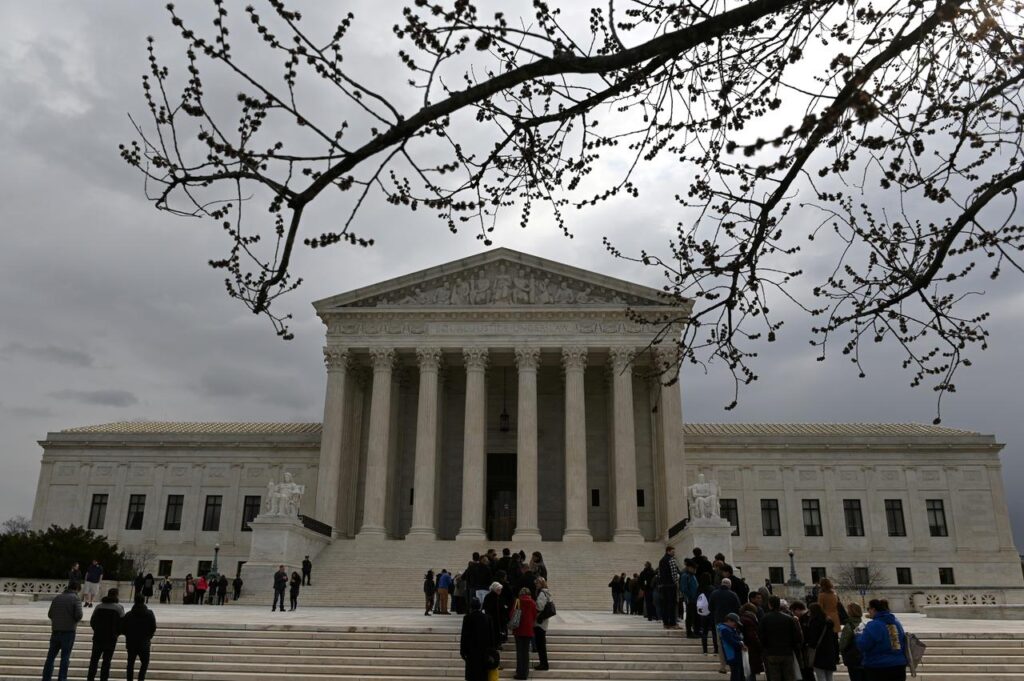WASHINGTON: The Supreme Court on Tuesday endorsed the US government’s authority to detain immigrants awaiting deportation anytime – potentially even years – after they have completed prison terms for criminal convictions, handing President Donald Trump a victory as he pursues hardline immigration policies.
The court ruled 5-4 along ideological lines, with its conservative justices in the majority and its liberal justices dissenting, that federal authorities could pick up such immigrants and place them into indefinite detention anytime, not just immediately after they finish their prison sentences.
The ruling, authored by conservative Justice Samuel Alito, left open the possibility that some individual immigrants could challenge their detention. These immigrants potentially could argue that the use of the 1996 federal law involved in the case, the Illegal Immigration Reform and Immigrant Responsibility Act, against them long after finishing their sentences would violate their due process rights under the U.S. Constitution.
The law states the government can detain convicted immigrants “when the alien is released” from criminal detention. Civil rights lawyers argued that the language of the law shows that it applies only immediately after immigrants are released. The Trump administration said the government should have the power to detain such immigrants anytime.
It is not the court’s job, Alito wrote, to impose a time limit for when immigrants can be detained after serving a prison sentence. Alito noted that the court has said in the past that “an official’s crucial duties are better carried out late than never.”
Alito said the challengers’ assertion that immigrants had to be detained within 24 hours of ending a prison sentence is “especially hard to swallow.”
In dissent, liberal Justice Stephen Breyer questioned whether the U.S. Congress when it wrote the law “meant to allow the government to apprehend persons years after their release from prison and hold them indefinitely without a bail hearing.”
Tuesday’s decision follows a February 2018 ruling in a similar case in which the conservative majority, over liberal dissent, curbed the ability of immigrants held in long-term detention during deportation proceedings to argue for release.
‘MOST EXTREME INTERPRETATION’
Cecilia Wang, the American Civil Liberties Union lawyer who argued the newly decided case for the challengers, said that in both rulings “the Supreme Court has endorsed the most extreme interpretation of immigration detention statutes, allowing mass incarceration of people without any hearing, simply because they are defending themselves against a deportation charge.”
Trump has backed limits on legal and illegal immigrants since taking office in January 2017.
Kerri Kupec, a U.S. Justice Department spokeswoman, said administration officials were pleased with the ruling.
In both of the detention cases, the Supreme Court reversed the San Francisco-based 9th U.S. Circuit Court of Appeals, a liberal-leaning court that Trump has frequently criticized. In each case, litigation against the federal government started before Trump took office.
In the latest case, the administration had appealed a 2016 9th Circuit ruling that favored immigrants, a decision it said would undermine the government’s ability to deport immigrants who have committed crimes.
The appeals court had said that convicted immigrants who are not immediately detained by immigration authorities after finishing their sentences but then later picked by immigration authorities could seek bond hearings to argue for their release.
The plaintiffs included two legal U.S. residents involved in separate lawsuits filed in 2013, a Cambodian immigrant named Mony Preap convicted of marijuana possession and a Palestinian immigrant named Bassam Yusuf Khoury convicted of attempting to manufacture a controlled substance.
Under federal immigration law, immigrants convicted of certain offenses are subject to mandatory detention during their deportation process. They can be held indefinitely without a bond hearing after completing their sentences.
In the most significant immigration-related case recently before the court, the conservative justices were also in the majority in June 2018 when they upheld on a 5-4 vote Trump’s travel ban on targeting people from several Muslim-majority countries.
But in April 2018, conservative Trump appointee Neil Gorsuch joined with the court’s four liberal justices in a 5-4 ruling that could hinder the administration’s ability to step up the removal of immigrants with criminal records, invalidating a provision in another law, the Immigration and Nationality Act.














